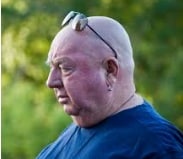 The adjective hairless is used to describe someone who lacks hair . The term is usually used with respect to a man who does not have a beard or who has little or no body hair .
The adjective hairless is used to describe someone who lacks hair . The term is usually used with respect to a man who does not have a beard or who has little or no body hair .
For example: “The English actor had to shave to give life to a new character and surprised with his hairless look at the award ceremony,” “The crime suspect was described by witnesses as a thin, short and hairless young man.” " , "More and more men are making the decision to shave to have a hairless chest."
Hairless or glabrous skin is skin that is not covered by hair. In certain areas of the human body, it is common to have hairless skin, such as the palms of the hands or the lips. For aesthetic, cultural or hygienic reasons, many people choose to remove the hair that grows naturally on the face, chest, legs or genitals, generating hairless areas.
There are diseases and disorders that can cause a man to be hairless and, therefore, not to grow a beard or hair in different parts of the body. Klinefelter syndrome , to cite one case, is a chromosomal mutation that causes this peculiarity.
This genetic condition occurs in men who have an extra X chromosome. Most human beings have forty-six chromosomes, and these contain DNA and all the genes, the bases of our structure and the functioning of each of our parts. The X and Y chromosomes are the sexual ones, which determine whether an individual will be a man or a woman: the former usually have one of each, while women have two X.
Klinefelter syndrome occurs when a man is born with an extra X chromosome, although he can have even more. For example, we could talk about XXY, instead of XY. This syndrome occurs with a minimum frequency of 1 in 500 , and a maximum frequency of 1 in 1000 . Mothers over 35 years of age increase the chances of their male children.
In addition to being hairless, a man with this syndrome usually presents other symptoms , including the following:
* infertility. In fact, this is the most common symptom;
* anomalies in body proportions (trunk too short, legs too long, etc.);
* gynecomastia, that is, breasts that are too large for the size they should be in a man;
 * sexual disorders;
* sexual disorders;
* testicles that are too small and abnormally firm;
* penis of a smaller size than normal;
* too much height.
Being hairless can be a problem in certain societies where men are expected to have a muscular, hairy body. Although this image becomes more outdated every day, ideas like this are the ones that govern many groups in which there is no room for individuals who see life with a different perspective.
The problem begins when concepts are associated to the point of making them indivisible: when it is said that every human being should be heterosexual, that men should be stronger than women and that they should not take care of their physical appearance, that they should work to support their couple, etc.
Despite these impositions, as mentioned above, there are many men who actively decide to become hairless, so to speak, by removing hair from certain parts of the body.
It should be noted that, in the field of botany , the idea of hairless also appears. There are plants that have hair on their stems and leaves, as do certain fruits on their surface. A hairless stem , in this context, does not have such hairs. Hairless wheat , similarly, lacks hair on the floral glumes.
